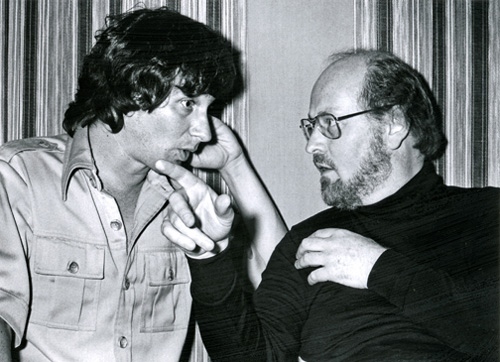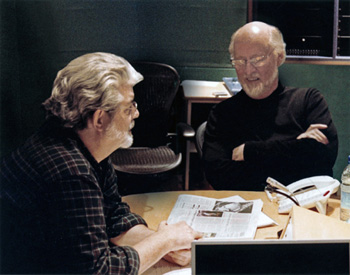

  |
|
|
||||||||||||||||||||||
|
FMS FEATURE... February 8, 2012 Spielberg and Lucas on Williams Directors reminisce about collaborating with Hollywood's greatest composer by Jon Burlingame Composer John Williams turns 80 today. The five-time Oscar winner (out of a record 47 nominations) will probably celebrate quietly at his Los Angeles home. He did not attend Monday's Academy Award nominees luncheon, probably because he is already at work on the music for Steven Spielberg's next film, Lincoln, due for release later this year.  Spielberg and Williams working on Close Encounters of the Third Kind (1977) "My admiration for him grows with every picture he scores, whether they're my pictures or someone else's," said Spielberg. "I'm more awestruck by John today than when I was when I first met him in the early '70s." Spielberg reminisced about their initial meeting in 1973 while working on his first feature, The Sugarland Express: "I sought John out after admiring two of his scores, The Reivers and The Cowboys. Throughout my childhood, even before I began making 8mm movies, I collected soundtrack albums. My heroes were Dimitri Tiomkin and Franz Waxman and Miklos Rozsa and Bernard Herrmann and on and on and on. I was a film score addict. "I knew he had done those great scores, and there were some others... like Fitzwilly, I think it kind of amazed him that I whistled the main theme from Fitzwilly, a film that most people haven't heard about, let alone the score. So John and I embarked on a great odyssey together." Citing their second film, Jaws, as a benchmark, Spielberg said, "John became the shark when the shark failed to show up for work because of mechanical difficulties. John became the musical leviathan and provided Jaws with a signature. It was as important as the shark itself. Without that musical signature, Jaws would have been half as successful." Asked about the details of their work process, Spielberg explained: "I usually try to give him the book or the script to go on. Sometimes he reads it and sometimes he doesn't, depending on how busy he is. What John prefers to do is just talk a lot with me, before I even make the movie -- about what the picture's about and how I see it. Then after I'm finished with the picture, I show John a very rough assembly. And then John, without really needing to hear any more from me because the film pretty much says it all, goes off and writes his themes. Then he performs sketches of the themes for me on the piano. "I usually fall in love with all of his themes. I've often made a fool of myself sitting there weeping, hanging over the piano after he's played me something, either from E.T. or Schindler's List. Or I just admire what he's done. More often than not, the first thing he plays me is what goes into the movie." He said they had never been in conflict over a musical approach: "Never. I don't think there's been a single moment where we've had a disagreement about music. We certainly have a high regard for each other, but I just think that's about Johnny hitting the target in an uncanny way." Asked whether he calls Williams "John" or "Johnny," he surprised me: "I call him Max. As a matter of fact, when I named my first child Max, that came from a nickname that I gave Johnny from the first time we met. It's a joke that sometimes his music reminded me of Max Steiner. And he would always laugh, so I got to calling him Max." Lucas said his choice of Williams for Star Wars in 1976 was "primarily on Steven's recommendation. I said I was looking for a composer who could write in the classic Hollywood style of the '30s and '40s, and he said 'John's the man for you, he's fantastic.' I was a little nervous at first because I only knew him primarily as a jazz guy; I wasn't that aware of his film work. "I thought, 'Really? He can really do [Erich Wolfgang] Korngold and [Alfred] Newman and all the classic guys? And Steven said, 'Oh yeah, he's perfect.' When you get into this kind of score, it's a much more complex and difficult undertaking, and if you don't have somebody who really knows what they're doing, it can get out of hand and go crazy very fast."  Lucas and Williams during production of Star Wars, Episode III: Revenge of the Sith (2005) Back on the first Star Wars film in 1976, Lucas said, "I told him 'I'm basically doing a silent movie and I need to have the discipline of the way silent movie-music was written.' He understood completely and he was very excited about it immediately. So it's been a great collaboration over 25 years." Asked about the Indiana Jones films, which Lucas produced and Spielberg directed, Lucas said, "In those, Steven was really working with John. Steven works with him pretty much the same way I do. We go through a spotting session, explain what you want and what your intentions are -- whether suspenseful or dramatic, or having military or religious overtones, or whatever it is the way you're describing the scene. And then John goes off and works his brilliance. "The score is a very, very important element of the success of the [Star Wars] movies. Without somebody as brilliant as Johnny doing the scores, I don't think they would have been as successful as they were. The score is a major element. It's equal to the script or the cast, easily." Added Spielberg: "John's already gone down in history as a symphonic composer and conductor. He really legitimized himself through his several decades with the Boston Pops. He rose above how film music is perceived by the serious classicists and aficionados of great music. I think he's been accepted in that circle, not just because he writes great film music but because he has composed some extraordinary stuff on his own outside of the motion picture." He went on to say that Lucas had called him that morning from London and held the telephone up so that he could hear portions of Attack of the Clones played live by the London Symphony Orchestra. "I listened for half an hour," he said, chuckling. "That's sort of a tradition. George and I are always holding up the phones on each other's movies when John's in the room." ©2012 Jon Burlingame |
Search
Past Features
Feature Archives
|